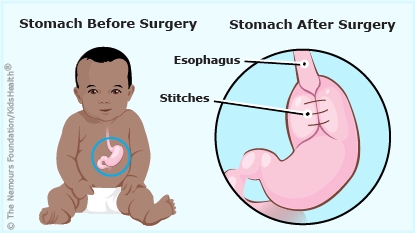After Nissen Fundoplication: How to Care for Your Child
The Nissen fundoplication is an anti-reflux procedure. Sometimes a gastrostomy tube (G-tube) is also placed into the stomach at the time of the procedure for nutrition. Children usually recover quickly after Nissen fundoplication.


Gastroesophageal reflux disease (GERD) causes food and acid to back up from the stomach into the esophagus. Severe reflux can damage the esophagus and cause choking and breathing problems. It also can keep a child from growing properly. Some children need tightening of the lower esophagus to prevent these health problems.
During the procedure, the surgeon wraps the upper portion of the stomach around the lower esophagus to prevent reflux. The surgeon also may place a G-tube to deliver nutrition directly into the stomach. In addition, the tube can be used to give medications and to release air from the stomach. You will be taught how to use the G-tube before you leave the hospital.

-
Depending on the situation, your child may be fed by mouth, through the G-tube, or both. Ask your health care provider how and what your child should be fed.
-
Some children require prescription pain medication at home. Give your child all medications as directed by your health care provider.
-
Remove the bandages as directed. Allow the wound closure strips to fall off on their own. Watch for signs of infection such as redness, swelling, or pus.
-
Keep the area around the G-tube clean with soap and water. Ask when your child can shower, take a bath, or go swimming.
-
Schedule a follow-up appointment with your child's surgeon.

-
Your child develops a fever, swollen abdomen, or severe retching.
-
Your child is having problems eating or swallowing.
-
You notice redness, swelling, or pus at the incisions.
-
You have concerns that the G-tube has fallen out or isn't working properly.
-
Your child's pain becomes severe or is not relieved by pain medication.
-
Your child develops a cough, fast breathing, diarrhea, or constipation.
-
You have any other questions or concerns.

-
Your child is wheezing, feels short of breath, or has difficulty breathing.
-
Your child appears dehydrated; signs include dizziness, drowsiness, dry mouth, sunken eyes, producing less urine or dark urine, and crying with little or no tears.
-
You have concerns that the G-tube has fallen out or isn't working properly, and you cannot get in touch with your health care provider.